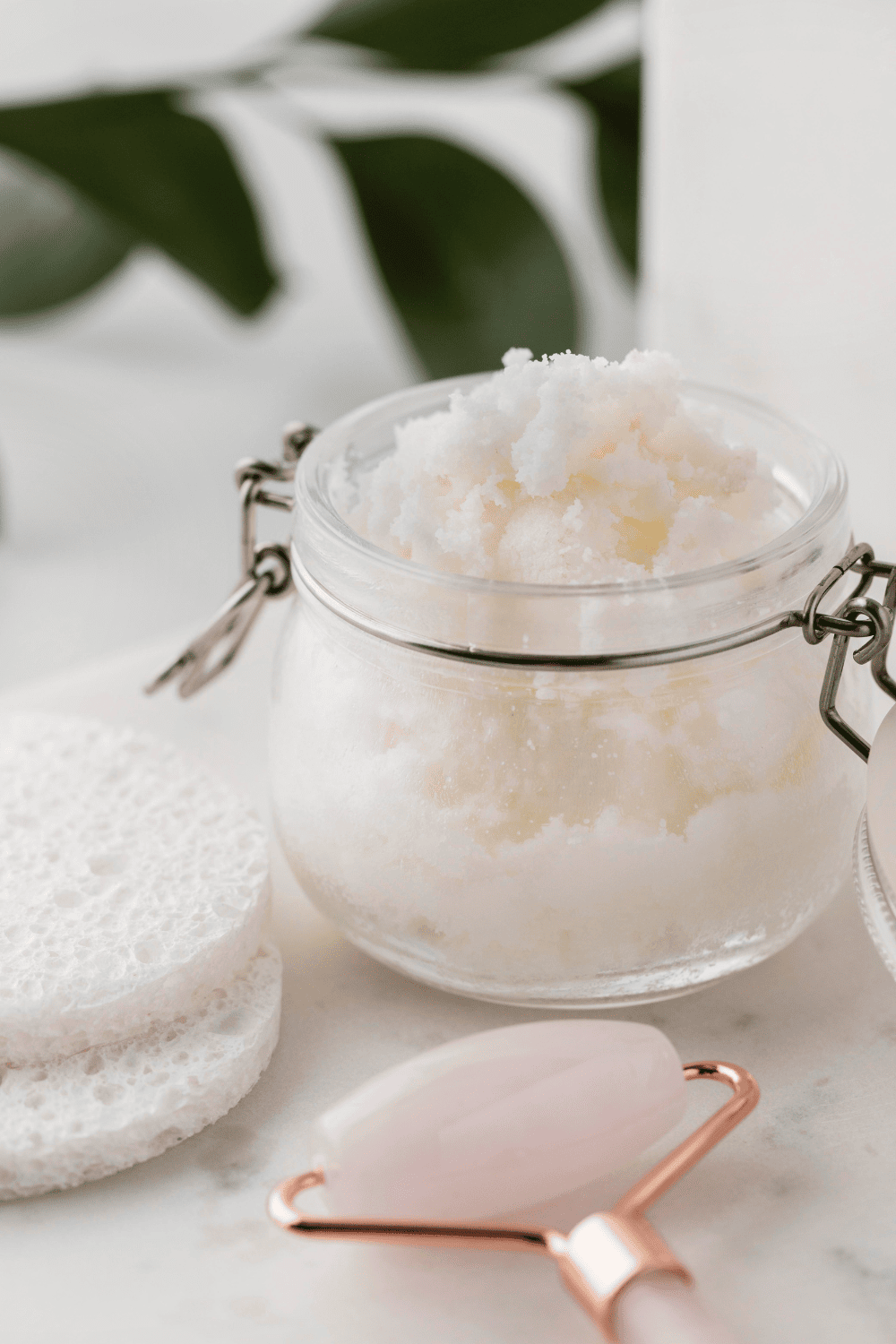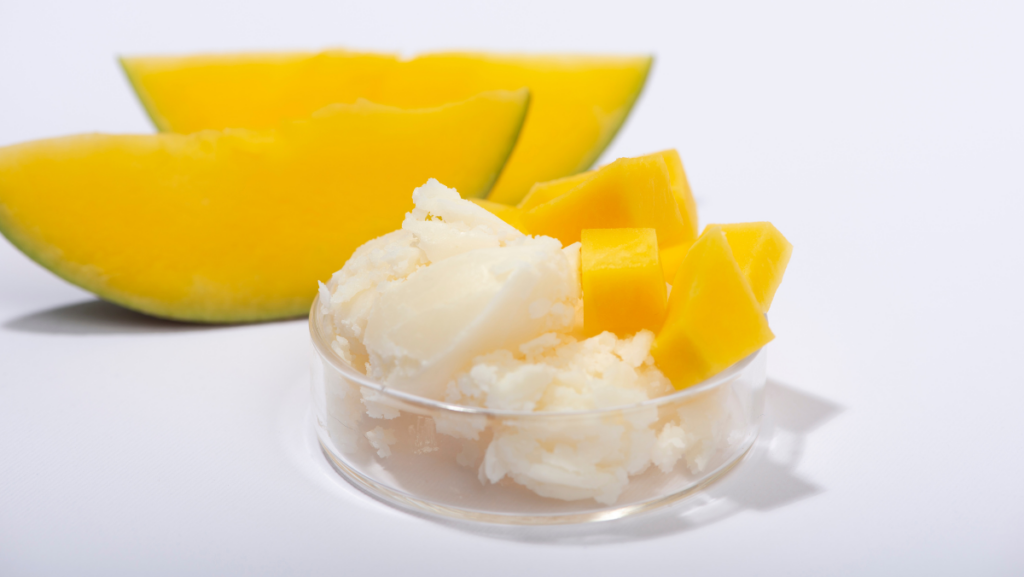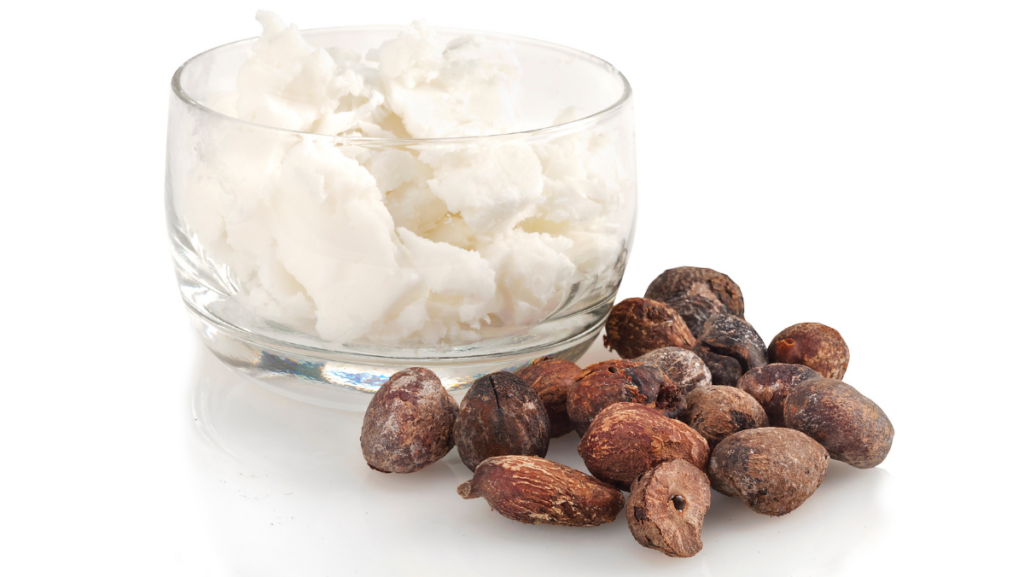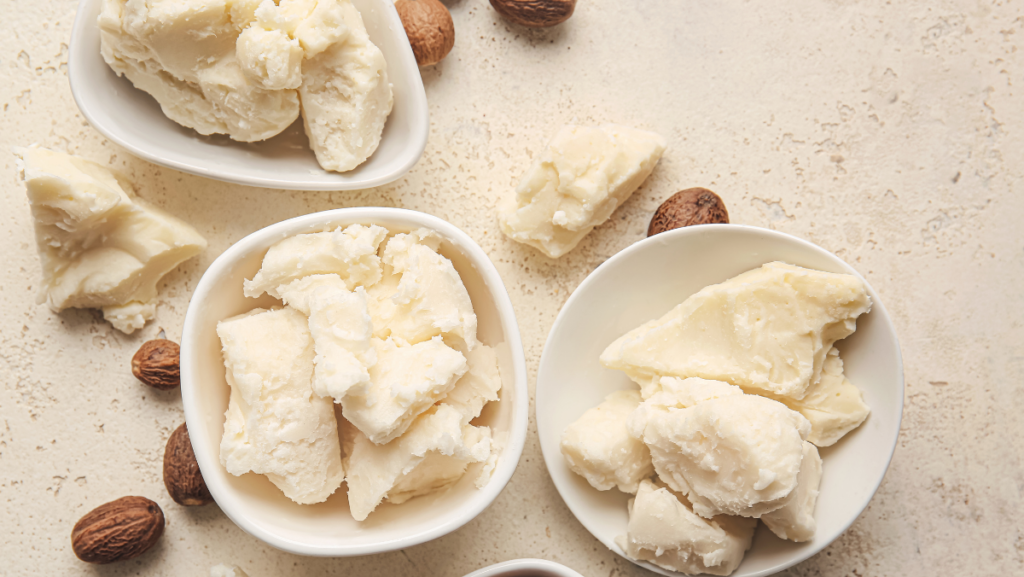
Mango butter and shea butter are prized ingredients in our favorite body creams and more. They make us feel moisturized and luxurious.
But what are the differences between mango butter and shea butter, and which is better for your specific skin needs? Let’s find out together!
Mango butter, derived from the mango seed, offers a variety of benefits that appeal to all skin types. Renowned for its creamy texture and lightweight consistency, it’s an easy favorite for those seeking a luxurious skin experience.
Shea butter, on the other hand, is extracted from the shea tree’s nut and has long been praised for its deeply moisturizing and nourishing properties. This wonder ingredient caters to a wide range of skin issues, fueling its popularity in the skincare world.
However, there are differences in texture, consistency, and even individual skin benefits. That’s why comparing these fantastic natural products and evaluating which one might serve your skin best is essential.
By the end of this article, you’ll be expertly able to choose your winner of the mango butter vs. shea butter debate.
Are you ready to load with the knowledge to nurture your skin in a way that suits you? Mango butter vs. shea butter: let’s go!
Mango Butter: Origin and Properties
Mango butter comes from the kernel of mango seeds (the inner softer part of a seed), and it’s an underrated, natural alternative for personal care.
Let’s learn about the origin and properties of this versatile ingredient, doing a deep dig into its excellent benefits.
Mangoes, scientifically known as Mangifera indica, are native to South Asia, specifically India, Nepal, and Myanmar.
Their popularity is not only due to their delicious taste but also the numerous health benefits associated with mangoes, including skin improvement and hair nourishment.
To extract mango butter, the kernel of the mango seed is first removed and then mechanically pressed, using cold or hot processes. Unrefined mango butter is off-white or pale yellow with a faint, neutral scent.
Mango butter has a rich and creamy texture that easily absorbs into the skin. It’s packed with essential fatty acids, antioxidants, and vitamins. Some of the key components are:
- Oleic acid
- Stearic acid
- Palmitic acid
- Vitamins A, C, and E

What Are The Key Properties Of Mango Butter?
The benefits of mango butter have not eluded science’s microscope. Here are the science-backed properties of mango butter. (check out this review and this study)
- Emollient properties: The high oleic and stearic acid content makes mango butter an excellent moisturizer, providing a soft and smooth texture to the skin.
- Antioxidant-rich: Mango butter is packed with vitamins A, C, and E, which fight oxidative stress and regenerate the skin.
- Anti-aging properties: Due to its antioxidant and moisturizing benefits, mango butter can counteract skin aging and promote healthy skin. In addition, it has been shown to significantly reduce wrinkles and skin roughness.
- Reduces sun damage: For the same reasons, mango butter can effectively reduce the damage caused by UV rays on your skin.
- Anti-microbial: Mango is an incredible natural antiseptic, boosting bacteria-killing properties.
- Anti-inflammatory: Mango butter possesses anti-inflammatory properties that help soothe irritated skin and promote the healing of minor skin abrasions.
- Wound-healing properties: Mango butter has been shown to effectively promote wound healing and reduce the appearance of post-wound scarring.
Compared to shea butter, mango butter is lighter and less greasy, thus easily absorbed by the skin. This non-comedogenic property means it won’t clog pores, making it suitable for people with acne-prone skin.
Pairing mango butter with other organic, plant-based ingredients can create unique and beneficial skincare products, providing a natural, healthy glow.
Shea Butter: Origin and Properties
It’s time for the famous shea butter. Let me dive into its background and unique characteristics, making it a favorite cosmetic product.
Shea butter is derived from the nuts of the shea tree (Vitellaria paradoxa), native to West Africa.
Shea butter extraction involves a series of steps, from collecting the shea nuts from the trees to obtaining a smooth paste.
The unrefined shea butter is then ready for use in cosmetic, medicinal, and culinary applications.
Pro tip: Always opt for the unrefined version of butters, as it is the most nutrient-rich! In the purification process, a lot of their active ingredients are removed.
Shea butter contains essential fatty acids and vitamins that nourish and protect the skin, like mango butter. Shea butter’s primary elements include:
- Oleic acid
- Stearic acid
- Linoleic acid
- Vitamins A, E, and F
What Are The Key Properties Of Shea Butter?
Let’s dive into shea butter’s properties. This versatile ingredient offers a wealth of benefits to the skin and hair (check out this comprehensive review). Here are some key attributes:
- Emollient properties: Shea butter is a powerhouse when it comes to moisturizing. Packed with vitamins A and E, it works wonders for hair, scalp, and skin. It effectively prevents water loss due to its water-binding properties. It is suitable for those with eczema.
- Anti-inflammatory: Shea butter has anti-inflammatory properties that help reduce redness, swelling, and irritation.
- Wound-healing properties: Raw, unrefined shea butter is a remarkable solution for various conditions, including skin rashes, scars, burns, and insect bites. It effectively addresses concerns like peeling, stretch marks, frostbite, arthritis, and muscle fatigue.
- Anti-aging: Shea butter is a potent moisturizer with collagen-boosting and UV anti-erythematic activity. This makes it an ideal ally for softening the skin and stimulating cell regeneration, effectively slowing down the aging process.
- UV protection qualities: Shea butter can work as a sun screening agent by absorbing and reflecting ultraviolet (UV) radiation. However, its SPF is relatively low, making extra sunscreen protection necessary.
- Hair care properties: Easily absorbed, shea butter nourishes and moisturizes a dry scalp, helping to prevent dandruff and hair loss.
Shea butter is also non-comedogenic. Therefore, shea butter doesn’t clog pores, making it suitable for various skin types, including acne-prone skin.
To sum up: Shea butter’s rich composition of fatty acids, vitamins, and antioxidants benefits the skin and hair in numerous ways, making it a cherished component in the world of beauty and skincare. Its uses are diverse and include the following:
- Moisturizing skin and hair
- Reducing stretch marks and scars
- Soothing skin irritations like eczema and dermatitis
- Alleviating sunburn pain
- Improving skin elasticity

What Are The Similarities And Differences Between Mango Butter And Shea Butter
Mango butter and shea butter are both remarkable natural ingredients with numerous benefits for the skin and hair. While they share some similarities in essential fatty acids and vitamins, they also have distinct characteristics that set them apart.
First, let’s make a quick side-by-side comparison of the main components of mango butter and shea butter:
| Ingredient | Mango Butter | Shea Butter |
| Oleic Acid | ✅ | ✅ |
| Stearic Acid | ✅ | ✅ |
| Palmitic Acid | ✅ | |
| Linoleic Acid | ✅ | |
| Vitamins A, C, and E | ✅ | |
| Vitamins A, E, and F | ✅ |
Mango Butter VS Shea Butter: The Similarities
In terms of similarities, both mango butter and shea butter possess emollient properties, making them excellent moisturizers that provide hydration and nourishment to the skin.
They also exhibit anti-inflammatory and wound-healing properties, promoting skin healing and soothing irritated skin.
Additionally, they contain vitamins that contribute to their antioxidant-rich nature, fighting oxidative stress and protecting the skin from aging.
More than merely moisturizing, both butters have proven beneficial in relieving several skin conditions:
| Skin Conditions | Mango Butter | Shea Butter |
| Eczema | Yes | Yes |
| Psoriasis | Yes | Yes |
| Dermatitis | Yes | Yes |
| Stretch marks | Yes | Yes |
Mango Butter VS Shea Butter: The Differences
However, there are notable differences between mango butter and shea butter. Mango butter is lighter in texture and less greasy, allowing for easy absorption into the skin. This makes it a preferred choice for those with oily or acne-prone skin, as it won’t clog pores.
On the other hand, shea butter has a creamy consistency, making it more suitable for dry skin types that require deep moisturization.
Also, regarding protection from the sun, mango butter can repair the sun’s damaging effect on the skin due to its antioxidant properties. On the other side, shea butter has a light sunscreen effect that can boost your regular SPF.
To summarize the similarities and differences between mango butter and shea butter:
| Mango Butter | Shea Butter | |
| Emollient Properties | Excellent moisturizer, softens the skin | Powerful moisturizer, prevents water loss |
| Anti-inflammatory | Soothes irritated skin, aids in healing | Reduces redness, swelling, and irritation |
| Wound Healing | Promotes wound healing, reduces scarring | Addresses various skin conditions |
| Antioxidant-rich | Fights oxidative stress, regenerates skin | Protects the skin, and slows down the aging process |
| UV Protection | Reduces sun damage | Works as a sun screening agent |
| Skin Type Suitability | Lightweight, suitable for oily skin | Creamy, suitable for dry skin |
Comparing Moisturizing Benefits Of Mango Butter VS Shea Butter
When it comes to moisturizing your skin, is there a winner between mango butter vs. shea butter?
The answer is probably no. Both mango butter and shea butter serve as outstanding moisturizers for the skin. They each have their unique array of essential fatty acids, vitamins, and other beneficial components that aid in providing deep hydration and nourishment.
Mango butter aids in boosting skin elasticity while providing deep hydration and soothing dry, irritated skin. It’s beneficial for those with sensitive skin due to its gentle nature.
On the other hand, shea butter is renowned for its moisturizing abilities and has been a go-to skincare ingredient for centuries. Shea butter assists in retaining moisture by forming a protective barrier on the skin’s surface.
This barrier helps reduce water loss and locks in hydration, making it an excellent choice for dry and flaky skin.
So, what will help you determine which is better for your skin? To do that, consider factors such as skin type, sensitivity, and desired texture.

Is Mango Butter Or Shea Butter Better For Your Skin?
The truth is, there is no definitive answer. Both mango butter and shea butter offer remarkable benefits and can be highly effective in nourishing and moisturizing your skin.
The answer lies in understanding your skin type and specific skincare concerns to determine which butter suits you best.
If you have oily or acne-prone skin, mango butter may be the perfect choice for you. With its lightweight texture and non-greasy formula, mango butter absorbs easily into the skin without clogging pores.
It provides excellent moisturization, softens the skin, and helps reduce the appearance of blemishes. Its anti-inflammatory properties can also soothe irritated skin and promote healing.
On the other hand, if you have dry or flaky skin, shea butter may be your skin’s best friend. With its creamy consistency and powerful moisturizing abilities, shea butter forms a protective barrier on the skin’s surface, preventing water loss and locking in hydration.
It helps retain moisture, improves skin elasticity, and reduces dryness and roughness. Shea butter is also beneficial for those with sensitive skin, as it has anti-inflammatory properties that can reduce redness, swelling, and irritation.
Mango Butter VS Shea Butter: A Conclusion
Discovering the perfect butter for your skin is an exciting journey. Enter the ring: mango butter vs. shea butter.
There’s no clear winner here. It all depends on your unique skin type and preferences. If you crave a lightweight, gentle option, mango butter is your match. If deep moisturization and nourishment are your goals, shea butter is your champion.
Choose the butter that speaks to your skin’s needs and bask in the joy of indulging your skin with nature’s finest ingredients!

Mango butter is as useful as shea butter to a great extent. But extraction of Shea butter has led to the destruction of Shea trees. I recommend that mango butter be promoted to save Shea butter trees since mango butter comes from mango trees that can be grown anywhere by farmers.
I appreciate your addition to this post! Thank you for your conscious remark. 🙂